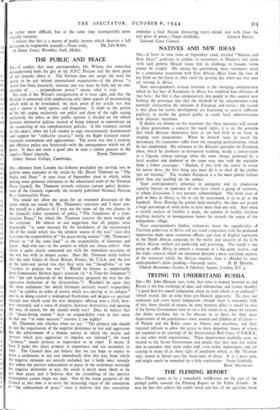THE PUBLIC AND PEACE susisect that your correspondent, Mr. Wilson,
has somewhat misunderstood both the gist of the N.P.C. Petition and the main point of my remarks about it. The Petition does not accept the need for power to be put behind international organisation—if the phrase "a world free from insecurity, injustice and war must be built not on con- ceptions of . . . . preponderent power" means what it says.
But even if Mr. Wilson's interpretation of it were right, and that the Petition is concerned with emphasising only those aspects of peacemaking which tend to be overlooked, the main point of my article was that such a course is both unwise and dangerous. It leads to the parties of the left urging exclusively one policy and those of the right urging exclusively the other, so that public opinion is divided on the choice between alternative policies instead of being induced to concentrate on the reconciling of two complementary policies. A like tendency existed in the 1930's, when the Left tended to urge simultaneously disarmament and support for "collective security," while the Right favoured simul- taneously rearmament and appeasement. The result was that a realistic and effective policy was frustrated—with the consequences which we all know. It does not seem a good idea to start a similar process in the 194o's.—Yours sincerely, DAVID THOMSON. Sidney Sussex College, Cambridge.


























 Previous page
Previous page